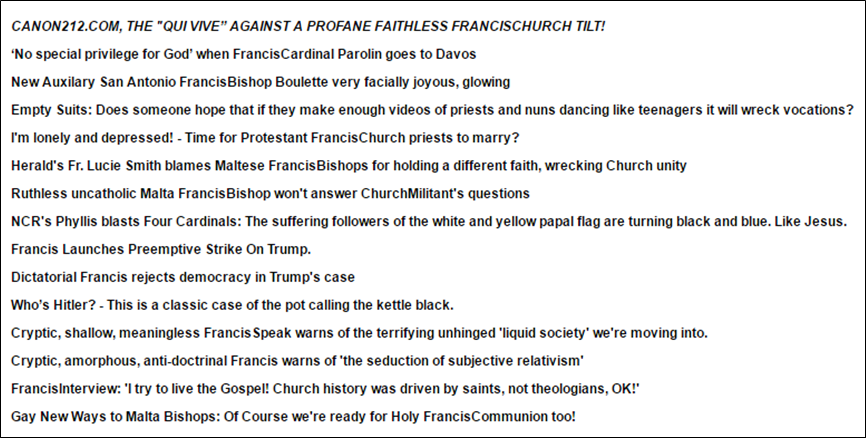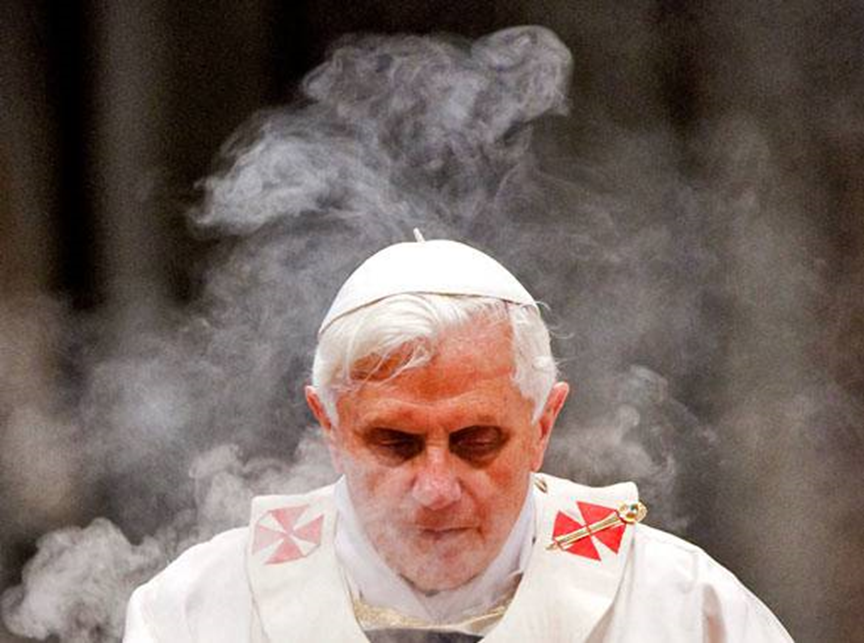January 23, 2017 headlines
Canon212.com
 PewSitter
PewSitter


 Two sites yesterday cited Benedict XVI on truth and morality, not surprising given the apparent relativism that has characterized the reigning
Two sites yesterday cited Benedict XVI on truth and morality, not surprising given the apparent relativism that has characterized the reigning
pope's statements on sin, the sacraments and conscience. What surprised me is that one of the citations was made by someone who has been a
1000-percent outspoken Bergoglidolator (for which reason, I have not used his posts at all) but perhaps it is his way of dealing with the current
Bergoglio-generated crisis of the faith, without having to make any direct references while squaring with his own conscience.
Benedict XVI:
‘The concept of truth has become suspect’
by Deacon Greg Kandra

JANUARY 23, 2017
It might be useful for us all at this moment to revisit the wisdom of Pope Benedict XVI. In a conversation with journalist Peter Seewald, Benedict expounded on a phrase that has become closely associated with him and the times in which we live: the dictatorship of relativism.
In his futuristic novel Brave New World, the British author Aldous Huxley had predicted in 1932 that falsification would be the decisive element of modernity. In a false reality with its false truth – or the absence of truth altogether – nothing, in the final analysis, is important any more.There is no truth, there is no standpoint. Today, in fact, truth is regarded as far too subjective a concept for us to find therein a universally valid standard. The distinction between genuine and fake seems to have been abolished. Everything is to some extent negotiable. Is that the relativism against which you were warning so urgently?
It is obvious that the concept of truth has become suspect. Of course it is correct that it has been much abused. Intolerance and cruelty have occurred in the name of truth. To that extent people are afraid when someone says, “This is the truth”, or even “I have the truth.” We never have it; at best it has us.
No one will dispute that one must be careful and cautious in claiming the truth. But simply to dismiss it as unattainable is really destructive. A large proportion of contemporary philosophies, in fact, consist of saying that man is not capable of truth.
But viewed in that way, man would not be capable of ethical values, either. Then he would have no standards. Then he would only have to consider how he arranged things reasonably for himself, and then at any rate the opinion of the majority would be the only criterion that counted.
History, however, has sufficiently demonstrated how destructive majorities can be, for instance, in systems such as Nazism and Marxism, all of which also stood against truth in particular.
“We are building a dictatorship of relativism”, you declared in your homily at the opening of the conclave [in 2005], “that does not recognize anything as definitive and whose ultimate standard consists solely of one’s own ego and desires.”
That is why we must have the courage to dare to say: Yes, man must seek the truth; he is capable of truth. It goes without saying that truth requires criteria for verification and falsification. It must always be accompanied by tolerance, also.
But then truth also points out to us those constant values which have made mankind great. That is why the humility to recognize the truth and to accept it as a standard has to be relearned and practiced again.
The truth comes to rule, not through violence, but rather through its own power; this is the central theme of John’s Gospel: When brought before Pilate, Jesus professes that he himself is The Truth and the witness to the truth. He does not defend the truth with legions but rather makes it visible through his Passion and thereby also implements it.
- Excerpted from Light of the World: The Pope, The Church and the Signs Of The Times: A conversation with Peter Seewald, 2010
From Cardinal Ratzinger’s homily during the 2005 conclave:
All people desire to leave a lasting mark. But what endures? Money does not. Even buildings do not, nor books. After a certain time, longer or shorter, all these things disappear.
The only thing that lasts for ever is the human soul, the human person created by God for eternity. The fruit that endures is therefore all that we have sown in human souls: love, knowledge, a gesture capable of touching hearts, words that open the soul to joy in the Lord.
So let us go and pray to the Lord to help us bear fruit that endures. Only in this way will the earth be changed from a valley of tears to a garden of God.
 yesterday also featured the ff quotation from Cardinal Ratzinger's pre-conclave homily on April 18, 2005, the day before he was elected pope.
yesterday also featured the ff quotation from Cardinal Ratzinger's pre-conclave homily on April 18, 2005, the day before he was elected pope.
A clear faith based on the Creed
Joseph Cardinal Ratzinger
April 18, 2005
Let us dwell on only two points. The first is the journey towards “the maturity of Christ”, as the Italian text says, simplifying it slightly.
More precisely, in accordance with the Greek text, we should speak of the “measure of the fullness of Christ” that we are called to attain if we are to be true adults in the faith. We must not remain children in faith, in the condition of minors. And what does it mean to be children in faith?
St Paul answers: it means being “tossed here and there, carried about by every wind of doctrine” (Eph 4: 14). This description is very timely!
How many winds of doctrine have we known in recent decades, how many ideological currents, how many ways of thinking. The small boat of the thought of many Christians has often been tossed about by these waves – flung from one extreme to another: from Marxism to liberalism, even to libertinism; from collectivism to radical individualism; from atheism to a vague religious mysticism; from agnosticism to syncretism and so forth.
Every day new sects spring up, and what St Paul says about human deception and the trickery that strives to entice people into error (cf. Eph 4: 14) comes true.
Today, having a clear faith based on the Creed of the Church is often labeled as fundamentalism. Whereas relativism, that is, letting oneself be “tossed here and there, carried about by every wind of doctrine”, seems the only attitude that can cope with modern times.
We are building a dictatorship of relativism that does not recognize anything as definitive and whose ultimate goal consists solely of one’s own ego and desires.
We, however, have a different goal: the Son of God, the true man. He is the measure of true humanism. An “adult” faith is not a faith that follows the trends of fashion and the latest novelty; a mature adult faith is deeply rooted in friendship with Christ.
It is this friendship that opens us up to all that is good and gives us a criterion by which to distinguish the true from the false, and deceipt from truth.
We must develop this adult faith; we must guide the flock of Christ to this faith. And it is this faith – only faith – that creates unity and is fulfilled in love.
And eight years later, the cardinals elect a man who is now the unabashed POPE OF RELATIVISM!
[Modificato da TERESA BENEDETTA 24/01/2017 19:57]